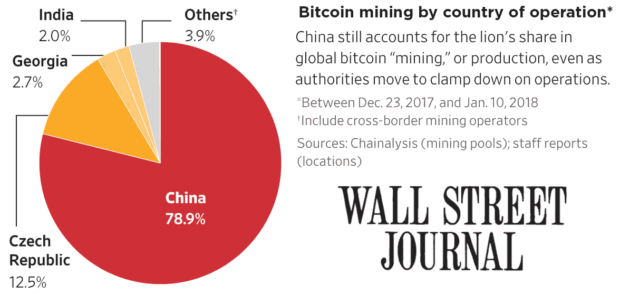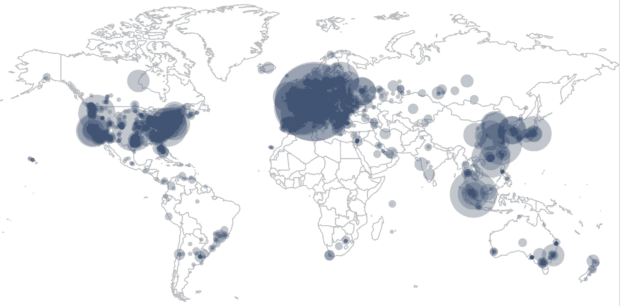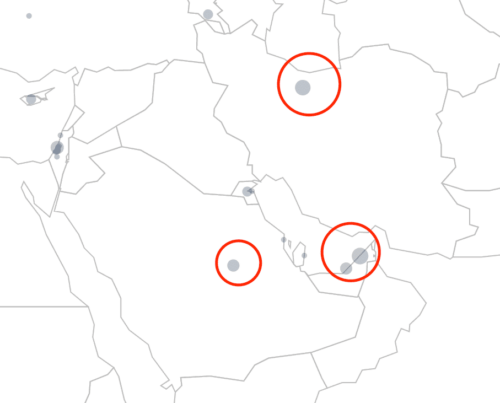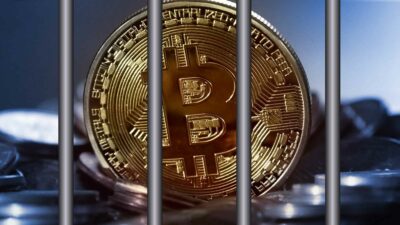Have you been mining cryptocurrency in your basement or buying and trading coins? Depending on where you live, you might be breaking the law. Bitcoin is illegal in more countries than you might realize and the Bitcoin banned countries list is no joke. A lot of these countries will prosecute you with force. Here are the countries where you should think twice before Bitcoin mining or getting involved in cryptocurrency.
WARNING: Laws change all the time. The information in this article may be out of date by the time that you read it. Research your local laws before getting involved in cryptocurrency and proceed with caution.
Here are the countries where Bitcoin is illegal and where you should think twice before Bitcoin mining or getting involved in cryptocurrency ... #bitcoinnews #cryptocurrency #illegalcryptocurrency #bitcoin $btc Share on XAlgeria
Illegal – If you live in the Northen African nation of Alergia, you aren’t allowed to buy, sell or possess any form of cryptocurrency. The declaration was made in the Algerian “Journal Officiel” on December 2017. All types of cryptocurrency, like Bitcoin is illegal, and breaking the law is punishable by both law and force.
Bangladesh
Banking Ban – You can probably safely mine cryptocurrency in Bangladesh, but it would be a very risky endeavor and you wouldn’t be able to use your cryptocurrency locally. In the fall of 2014, the Bangladesh Bank made a statement saying that “anybody caught using virtual currency could be jailed under the country’s strict anti-money laundering laws” for up to 12 years. Gulp.
Bolivia
Illegal – Bolivia issued a complete and total ban on all types of cryptocurrency in 2014. The Central Bank of Bolivia issued a formal resolution banning all cryptocurrencies as well as other currencies not regulated by a country.
Cambodia
Banking Ban – Although there’s currently no government documentation banning Bitcoin mining, the National Bank of Cambodia has instructed all banks in Cambodia to “not to allow people to conduct transactions with cryptocurrencies.” Government regulators have also stated that any companies that want to use cryptocurrency must first obtain a license, otherwise, their activities will be considered illegal.
Canada
Banking Ban – Even though there’s a lot of Bitcoin mining happening in Canada, there is a Canadain banking ban on cryptocurrency.
Colombia
Illegal – In 2014, the Columbian government’s Superintendencia Financiera issued an implied ban and warned financial institutions that they may not “protect, invest, broker, or manage virtual money operations”.
China
Illegal – Bitcoin is illegal in China and the Chinese government continues to tighten regulations against cryptocurrency on a regular basis.
- December 2013: The People’s Bank of China introduces regulation banning all Chinese financial institutions from being involved in cryptocurrency transactions.
- April 2014: The People’s Bank of China orders all Chinese financial organizations to close any cryptocurrency accounts that they might have. As a result, financial firms in China are not allowed to possess, or trade Bitcoin or any other types of cryptocurrencies.
- September 2017: China bans all cryptocurrency trading services and forces the shutdown of almost 200 exchange platforms.
- January 2018: China’s State Administration of Foreign Exchange begins a massive crackdown on Bitcoin mining.
According to a 2018 report in the Wall Street Journal, illegal bitcoin mining is rampant in China. Almost 80% of all global crypto-mining between 2017 and 2018 took place in China.

Even though Bitcoin is illegal in China and the government is actively cracking down, that hasn’t stopped Chinese entrepreneurs willing to take major risks. Here’s a chart from August 2019 showing all active Bitcoin nodes around the world. As you can see, despite the Chinese government’s regulation efforts, illegal Bitcoin mining is still very active in China.

But don’t expect the China Bitcoin ban to last forever. The Chinese government probably has a hidden agenda behind their crypto crackdowns. According to recent reports, they are working on their own national Chinese cryptocurrency. Once that’s ready, the government will likely reverse their position on cryptocurrency.
Egypt
Illegal – In December 2017, the Dar al-Ifta, the Egyptian authority on religious law, issued a religious decree banning cryptocurrency. The decree states that all activities involving cryptocurrencies are haram and prohibited under Islamic law.
Equador
Illegal – In 2014, the National Assembly of Ecuador banned bitcoin and other decentralized cryptocurrencies. However, their motivation wasn’t necessarily rooted in protecting their citizens. At the time, the Ecuadorian government was planning a state-run electronic money system connected to local currency and controlled by the government.
Even though they were praised for being the first country with an official digital currency, Equador’s state-run digital currency attempt failed and was shut down on March 2018. Nevertheless, Ecuador’s ban on cryptocurrency still stands.
India
Banking Ban – In February 2018, India’s finance minister Arun Jaitley made it clear that India’s financial institutions should avoid all cryptocurrencies.
“The government does not recognize cryptocurrency as legal tender or coin and will take all measures to eliminate the use of these crypto-assets,” Jaitley said stated in his annual budget speech.
Additionally, the Supreme Court Of India is reviewing a call to review the legality of virtual currencies and possibly ban their transactions.
Indonesia
Mostly Illegal – In December 2017, a regulation banning the use of all cryptocurrencies was issued by Bank Indonesia, the country’s central bank. Using cryptocurrencies for payment in Indonesia is illegal.
However, in February 2019, the Indonesian government started recognizing crypto assets as commodities that can be legally traded on Indonesia’s futures exchange. So you can speculate on cryptocurrencies, but you can’t directly own them.
Iran
Illegal – In April 2018, the Central Bank of the Islamic Republic of Iran issued a cryptocurrency ban for the country’s banks and financial organizations.
Even though Iran is on the ‘Bitcoin banned countries list’, there’s still some illegal Bitcoin mining activity taking place near Tehran. Very risky.

Jordan
Banking Ban – The government of Jordan discourages the use of cryptocurrencies and the Central Bank of Jordan prohibits all financial organizations, including banks and payment services, from using cryptocurrencies.
However, there’s no direct ban on mining. And many small businesses in Jordan offer Bitcoin and other virtual currencies as a payment option.
Morocco
Illegal – Morocco would rather people gamble their money in their world-famous casinos rather than in the cryptocurrency market. Starting in November 2017, the country of Morocco made it clear that cryptocurrency was not something they wanted their citizens involved in.
First, the Moroccan Office des Changes issued a public statement saying that “transactions via virtual currencies constitute an infringement of the exchange regulations, liable to penalties and fines.”
The exchange office’s statement was supported the following day by the Moroccan Ministry of Economy and Finance, Bank Al-Maghrib and the Moroccan Capital Market Authority. In a joint statement, the three organizations warned that cryptocurrency may be used “for illicit or criminal purposes, including money laundering and terrorist financing.”
Then a month later, Abdellatif Jouahri, the Chairman and Governor of Bank Al-Maghrib, called Bitcoin a “financial asset”, but not a currency. He also asked that a framework be established for consumer protection.
Nepal
Illegal – Do not get involved in cryptocurrency at all in Nepal. In August 2017, the Nepal Rastra Bank declared that Bitcoin is illegal along with other cryptocurrencies. Multiple violaters in Nepal have been arrested.
Pakistan
Illegal – In April 2018, the State Bank of Pakistan banned Bitcoin and all other cryptocurrencies.
You’ll need to set up camp across the northern border in Afghanistan if you want to get involved in cryptocurrency. Afghanistan is one of the few Middle Eastern countries where virtual currencies aren’t illegal.
Saudi Arabia
Banking Ban – Although Saudi Arabia hasn’t directly banned Bitcoin mining, they have declared a banking ban and told their citizens that Bitcoin is not an approved currency within the Kingdom. Additionally, the Saudi Arabian Monetary Authority issued a warning about cryptocurrency, declaring it as high risk without any guarantees, protections or legal rights.
Taiwan
Banking Ban – Similar to other countries like Saudi Arabia and Morocco, the Taiwanese government warns the public about the dangers of cryptocurrency and its lack of legal protection.
In addition to the general warning to the public, Taiwan also has a crypto-banking ban. All financial organizations in Taiwan are not allowed to facilitate cryptocurrency transactions. In 2014, the installation of several Bitcoin ATM machines was prevented because Bitcoin is not recognized as a currency in Taiwan.
Thailand
Banking Ban – In 2013, the Bank of Thailand was an outspoken critic of cryptocurrency. But in 2017, they loosened regulations a tiny bit allowing cryptocurrencies to be exchanged for the Thai Baht.
Despite this exclusion, both businesses and individuals in Thailand are forbidden from buying, exchanging or trading cryptocurrency, creating websites and apps that exchange cryptocurrency and providing any consulting related cryptocurrency services.
United Arab Emirates (UAE)
Illegal (For Most People) – In January 2017, the Central Bank of the United Arab Emirates declared that all “virtual currencies”, including cryptocurrencies, were prohibited. This is clearly stated under the Central Bank of the United Arab Emirates’s article D.7.3 of the Regulatory Framework for Stored Values and an Electronic Payment System.
However, cryptocurrencies aren’t exactly illegal for everyone in the UAE. In February 2018, the UAE based company, Regal RA Assets DMCC, was granted a Crypto-commodities trading license. Maybe it’s only illegal unless you know someone?
Vietnam
Illegal Payment Option – The State Bank of Vietnam labeled Bitcoin and other virtual currencies as illegal forms of payment. You can own cryptocurrency, but you can’t use it to buy goods or services in Vietnam. Violators can be fined up to 200,000,000 VND ($8,600 USD).
However, the ban doesn’t prevent people from trading cryptocurrency. Similar to other nations on the Bitcoin banned countries list, the Vietnam government is fine with people dealing with crypto assets. Two popular cryptocurrency exchanges, Bitcoin Vietnam and VBTC both operate without restrictions in Vietnam.
Is Cryptocurrency Haram Or Halal?
Despite the support of prominent Islamic scholars like Muslim legal expert Muhammad Abu Bakar, cryptocurrencies are still considered haram or forbidden in most Islamic countries, not halal. According to the Turkish Directorate of Religious Affairs, “buying and selling virtual currencies is not compatible with religion at this time because of the fact that their valuation is open to speculation, they can be easily used in illegal activities like money laundering and they are not under the state’s audit and surveillance.”
Countries Where Bitcoin Is Illegal – Are Your Surprised?
Are you just as surprised about this list of countries where Bitcoin is illegal as we are? Did you notice any patterns?
One point of caution, be extra careful in countries where elements of cryptocurrency are both legal and illegal. This list is even more dangerous than the banned list. If you’re not careful, you could end up in a weird trap where you might be able to own cryptocurrency but not sell or participate in Bitcoin mining.
Check Your Local Laws Before Attempting Bitcoin Mining Or Buying And Selling Cryptocurrency
You’ve been warned. Cryptocurrency like Bitcoin is illegal in many countries around the world. But as you can see from the map of active Bitcoin nodes, that isn’t stopping people willing t take some extreme risks.
Before buying cryptocurrency, attempting Bitcoin mining or any other activity involving cryptocurrency, research your local laws. Illegal Bitcoin mining could land you in jail. Also note, laws change all the time. Good luck out there!
Countries Where Bitcoin Mining and Even Just Owning Bitcoin Is Illegal (2019) Share on XRelated Articles:
- Incredible Uses For Blockchain Technology Beyond Cryptocurrency
- Mobile Payment Trends Retailers Need to Know About
- Why DDoS Attacks Are On The Rise Around The World
- Scenarios Where You Really Should Be Using a VPN Service

Frank Wilson is a retired teacher with over 30 years of combined experience in the education, small business technology, and real estate business. He now blogs as a hobby and spends most days tinkering with old computers. Wilson is passionate about tech, enjoys fishing, and loves drinking beer.











 13 Proven Ways To Help Reduce Shopping Cart Abandonment
13 Proven Ways To Help Reduce Shopping Cart Abandonment
Leave a Reply
You must be logged in to post a comment.